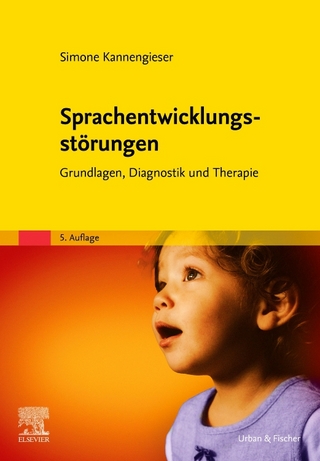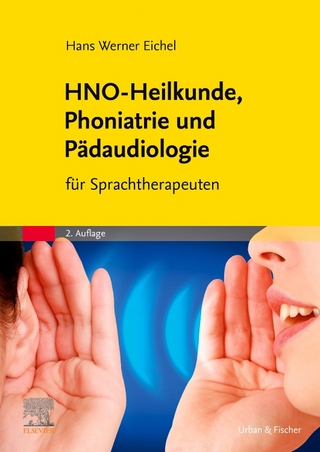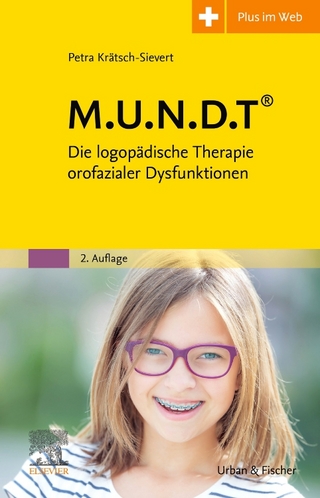
IEP Goal Writing for Speech-Language Pathologists
Plural Publishing Inc (Verlag)
978-1-63550-202-2 (ISBN)
IEP Goal Writing for Speech-Language Pathologists: Utilizing State Standards, Second Edition familiarizes the speech-language pathologist (SLP) with specific Early Learning Standards (ELS) and Common Core State Standards (CCSS) as well as the speech-language skills necessary for students to be successful with the school curriculum. It also describes how to write defensible Individualized Education Plan (IEP) goals that are related to the ELS and CCSS.
SLPs work through a set of steps to determine a student's speech-language needs. First, an SLP needs to determine what speech-language skills are necessary for mastery of specific standards. Then, the SLP determines what prerequisite skills are involved for each targeted speech-language skill. Finally, there is a determination of which Steps to Mastery need to be followed. It is through this process that an SLP and team of professionals can appropriately develop interventions and an effective IEP.
The text takes an in-depth look at the following speech-language areas: vocabulary, questions, narrative skills/summarize, compare and contrast, main idea and details, critical thinking, pragmatics, syntax and morphology, and articulation and phonological processes. These areas were selected because they are the most commonly addressed skills of intervention for students aged three to twenty-one with all levels of functioning. For each listed area, the text analyzes the prerequisite skills and the corresponding steps to mastery. It provides a unique, step-by-step process for transforming the steps to mastery into defensible IEP goals.
The key is to remember that the goal must be understandable, doable, measurable, and achievable. This text provides clear guidelines of quantifiable building blocks to achieve specific goals defined by the student's IEP. School-based SLPs are instrumental in helping students develop speech and language skills essential for mastery of the curriculum and standards. All SLPs working with school-aged children in public schools, private practice, or outpatient clinics will benefit from the information in this text.
New to the Second Edition
Material on measuring progress including 10 language checklists and 5 performance updates.
Goal writing case studies for four students of different ages and skill levels.
A thoroughly updated chapter on writing goals with up-to-date examples
Revised Prerequisite Skills and Steps to Mastery to reflect the current state of research.
Expanded focus on evidence-based practice.
A PluralPlus companion website containing printable forms and explanatory videos.
Lydia Kopel, EdS, CCC-SLP currently works for a contract company supervising clinical fellows and does training and consulting all over the United States. Ms. Kopel has over 39 years of experience which includes working as a Special Education Coordinator, a Lead Speech-Language Pathologist, and as a SLP in large metro school systems. During that time she developed several resource manuals for SLPs and teachers of the hearing impaired and visually impaired. She has worked with children ages 3 to 21 years of age and with all areas of exceptionality. She has a great interest in language-based learning disabilities and integrating the curriculum with speech therapy. Ms. Kopel was a member of the Georgia School-Based Speech-Language Pathologist Leadership Team, established through the Georgia Department of Education (GADOE). While on this team, she co-developed the Georgia State project SLPs Collaborating in General Education Classrooms: Practicing Seamless Education. She is also one of the founders and continues to be a member of the Georgia Organization for School-Based Speech-Language Pathologists which currently has over 700 members. Ms. Kopel is a member of ASHA and has her Georgia State License. Her personal interests include photography, traveling, and spending time with family and friends.++++++++++++++++++++++++++++++++++++++++++++++++++++++++++++++++++++++++++++++++++++++++++++++++++++Elissa Kilduff, M.A., CCC-SLP, currently works as a speech-language pathologist in a suburban school district. As one of five SLPs in an elementary school, she primarily serves PreK-2nd graders with a variety of disabilities and special needs. She collaborates extensively with administration, special educators, and general educators in the school regarding prior interventions, carryover into classrooms, in-class lessons, and communication-based behavior concerns. Prior to her current role, Ms. Kilduff served as the lead SLP in a large school system where she supervised and trained the county’s 150+ SLPs. She has a great interest in language-based learning disabilities, collaboration with general and special education teachers, behavior disorders, and curriculum-based interventions. Ms. Kilduff was a member of the Georgia School-Based Speech-Language Pathologist Leadership Team, established through the Georgia Department of Education (GaDOE). This team developed a state-wide training for SLPs and General Education Teachers on collaboration. She has designed resources including evidence-based interventions and progress monitoring rubrics for Response to Intervention (RTI); language checklists aligned to grade-level standards; and educational impact of common standardized language assessments. Ms. Kilduff is a member of ASHA and holds a Georgia state license and certification from the Professional Standards Commission. Outside of work, she enjoys spending time with her family and friends including her husband, daughter, and dog.
Preface
Chapter 1. Early Learning Standards
3 Year Olds
4 Year Olds
Chapter 2. Common Core State Standards (CCSS)
Kindergarten
1st Grade
2nd Grade
3rd Grade
4th Grade
5th Grade
6th Grade
7th Grade
8th Grade
9th–10th Grade
11th–12th Grade
Chapter 3. Prerequisite Skills and Steps to Mastery
Vocabulary
Questions
Narrative Tasks/Summarize
Main Idea and Details
Critical Thinking
Pragmatics
Syntax and Morphology
Articulation and Phonological Processes
Chapter 4. Writing IEP Goals
What to Include in a Goal
Criteria for Mastery
Measuring Progress
Goal Examples
Appendix 4–1. Goal Writing Worksheet
Appendix 4–2. Speech and Language Checklists
Appendix 4–3. Performance Update Template
References
Index
| Erscheinungsdatum | 17.07.2020 |
|---|---|
| Verlagsort | San Diego |
| Sprache | englisch |
| Maße | 216 x 279 mm |
| Themenwelt | Medizin / Pharmazie ► Gesundheitsfachberufe ► Logopädie |
| ISBN-10 | 1-63550-202-0 / 1635502020 |
| ISBN-13 | 978-1-63550-202-2 / 9781635502022 |
| Zustand | Neuware |
| Haben Sie eine Frage zum Produkt? |
aus dem Bereich


